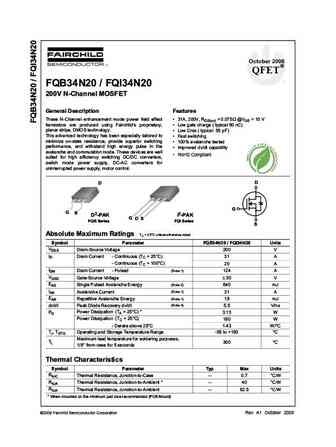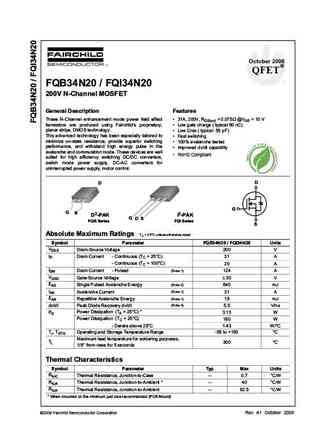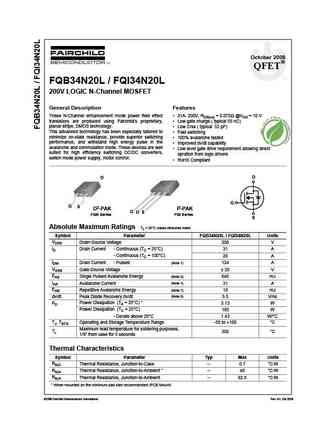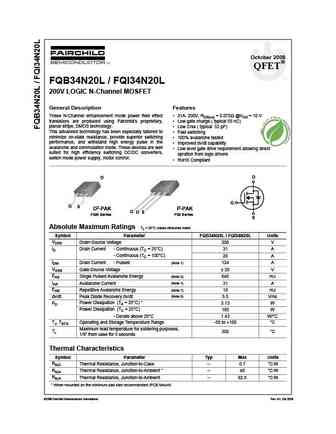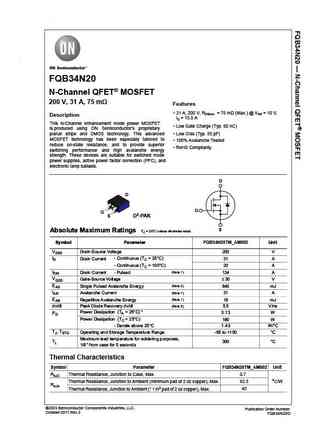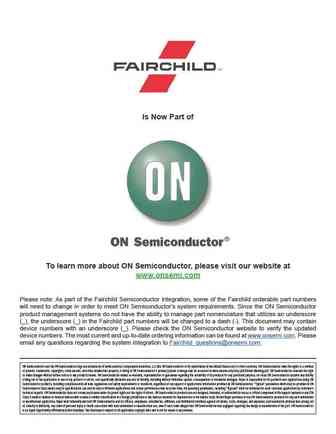FQB34N20TMAM002 MOSFET Equivalente. Reemplazo. Hoja de especificaciones. Principales características
Número de Parte: FQB34N20TMAM002
Tipo de FET: MOSFET
Polaridad de transistor: N
ESPECIFICACIONES MÁXIMAS
Pdⓘ - Máxima disipación de potencia: 180 W
|Vds|ⓘ - Voltaje máximo drenador-fuente: 200 V
|Vgs|ⓘ - Voltaje máximo fuente-puerta: 30 V
|Id|ⓘ - Corriente continua de drenaje: 31 A
Tjⓘ - Temperatura máxima de unión: 150 °C
CARACTERÍSTICAS ELÉCTRICAS
trⓘ - Tiempo de subida: 280 nS
Cossⓘ - Capacitancia de salida: 430 pF
RDSonⓘ - Resistencia estado encendido drenaje a fuente: 0.075 Ohm
Encapsulados: D2-PAK
Búsqueda de reemplazo de FQB34N20TMAM002 MOSFET
- Selecciónⓘ de transistores por parámetros
FQB34N20TMAM002 datasheet
fqb34n20tm am002.pdf
October 2008 QFET FQB34N20 / FQI34N20 200V N-ChanneI MOSFET GeneraI Description Features These N-Channel enhancement mode power field effect 31A, 200V, RDS(on) = 0.075 @VGS = 10 V transistors are produced using Fairchild s proprietary, Low gate charge ( typical 60 nC) planar stripe, DMOS technology. Low Crss ( typical 55 pF) This advanced technology has been especia
fqb34n20 fqi34n20.pdf
October 2008 QFET FQB34N20 / FQI34N20 200V N-ChanneI MOSFET GeneraI Description Features These N-Channel enhancement mode power field effect 31A, 200V, RDS(on) = 0.075 @VGS = 10 V transistors are produced using Fairchild s proprietary, Low gate charge ( typical 60 nC) planar stripe, DMOS technology. Low Crss ( typical 55 pF) This advanced technology has been especia
fqb34n20l fqi34n20l.pdf
October 2008 QFET FQB34N20L / FQI34N20L 200V LOGIC N-Channel MOSFET General Description Features These N-Channel enhancement mode power field effect 31A, 200V, RDS(on) = 0.075 @VGS = 10 V transistors are produced using Fairchild s proprietary, Low gate charge ( typical 55 nC) planar stripe, DMOS technology. Low Crss ( typical 52 pF) This advanced technology has been
fqb34n20ltm.pdf
October 2008 QFET FQB34N20L / FQI34N20L 200V LOGIC N-Channel MOSFET General Description Features These N-Channel enhancement mode power field effect 31A, 200V, RDS(on) = 0.075 @VGS = 10 V transistors are produced using Fairchild s proprietary, Low gate charge ( typical 55 nC) planar stripe, DMOS technology. Low Crss ( typical 52 pF) This advanced technology has been
Otros transistores... FQB2P40TM, FQB30N06LTM, FQB30N06TM, FQB32N12V2TM, FQB32N20CTM, FQB33N10LTM, FQB33N10TM, FQB34N20LTM, 50N06, FQB34P10TM, FQB3N25TM, FQB3N30TM, FQB3N40TM, FQB3N60CTM, FQB3N90TM, FQB3P20TM, FQB3P50TM
🌐 : EN ES РУ
Liste
Recientemente añadidas las descripciónes de los transistores:
MOSFET: FTF30P35D | FTF25N35DHVT | FTF15N35D | FTE15C35G | FTP02P15G | FTE02P15G | AKF30N5P0SX | AKF30N10S | AKF20P45D | CM4407 | CM3407 | CM3400 | SVF11N65F | SVF11N65T | FKBB3105 | EHBA036R1
Popular searches
2sa606 | 2n3644 | 2sc2240bl | 2sc1913 | c2314 transistor | c2482 transistor | 2sc1222 replacement | 2sa725
